 A member of the Centers for Disease Control and Prevention team leads a training session on Ebola infection control in Lagos, Nigeria, on Monday, August 11. Health officials say the Ebola outbreak in West Africa is the deadliest ever. The disease has spread to Liberia, Sierra Leone, Guinea and Nigeria, infecting more than 1,900 people and killing more than 1,000 this year, according to the World Health Organization.
A member of the Centers for Disease Control and Prevention team leads a training session on Ebola infection control in Lagos, Nigeria, on Monday, August 11. Health officials say the Ebola outbreak in West Africa is the deadliest ever. The disease has spread to Liberia, Sierra Leone, Guinea and Nigeria, infecting more than 1,900 people and killing more than 1,000 this year, according to the World Health Organization.  Health workers in Kenema, Sierra Leone, screen people for the Ebola virus on Saturday, August 9, before they enter the Kenema Government Hospital.
Health workers in Kenema, Sierra Leone, screen people for the Ebola virus on Saturday, August 9, before they enter the Kenema Government Hospital.  A health worker at the Kenema Government Hospital carries equipment used to decontaminate clothing and equipment on August 9.
A health worker at the Kenema Government Hospital carries equipment used to decontaminate clothing and equipment on August 9.  Health care workers wear protective gear at the Kenema Government Hospital on August 9.
Health care workers wear protective gear at the Kenema Government Hospital on August 9.  Paramedics in protective suits move Ebola-infected missionary Miguel Pajares at Carlos III Hospital in Madrid on Thursday, August 7. Pajares, a Spanish priest infected with Ebola while working in Liberia, died five days later.
Paramedics in protective suits move Ebola-infected missionary Miguel Pajares at Carlos III Hospital in Madrid on Thursday, August 7. Pajares, a Spanish priest infected with Ebola while working in Liberia, died five days later.  Nurses carry the body of an Ebola victim from a house outside Monrovia, Liberia, on Wednesday, August 6.
Nurses carry the body of an Ebola victim from a house outside Monrovia, Liberia, on Wednesday, August 6.  A Nigerian health official wears protective gear August 6 at Murtala Muhammed International Airport in Lagos, Nigeria.
A Nigerian health official wears protective gear August 6 at Murtala Muhammed International Airport in Lagos, Nigeria. 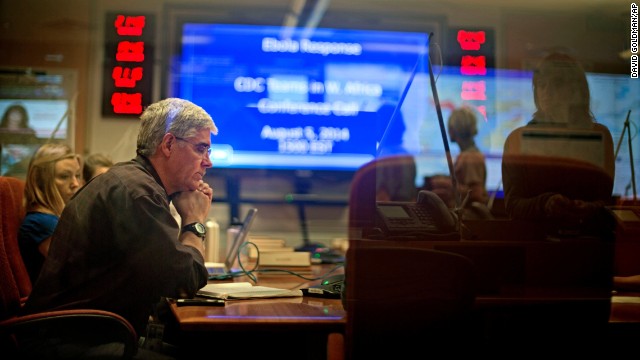 Officials with the Centers for Disease Control and Prevention in Atlanta sit in on a conference call about Ebola with CDC team members deployed in West Africa on Tuesday, August 5.
Officials with the Centers for Disease Control and Prevention in Atlanta sit in on a conference call about Ebola with CDC team members deployed in West Africa on Tuesday, August 5.  Aid worker Nancy Writebol, wearing a protective suit, gets wheeled on a gurney into Emory University Hospital in Atlanta on August 5. A medical plane flew Writebol from Liberia to the United States after she and her colleague Dr. Kent Brantly were infected with the Ebola virus in the West African country.
Aid worker Nancy Writebol, wearing a protective suit, gets wheeled on a gurney into Emory University Hospital in Atlanta on August 5. A medical plane flew Writebol from Liberia to the United States after she and her colleague Dr. Kent Brantly were infected with the Ebola virus in the West African country.  Nigerian health officials are on hand to screen passengers at Murtala Muhammed International Airport on Monday, August 4.
Nigerian health officials are on hand to screen passengers at Murtala Muhammed International Airport on Monday, August 4. 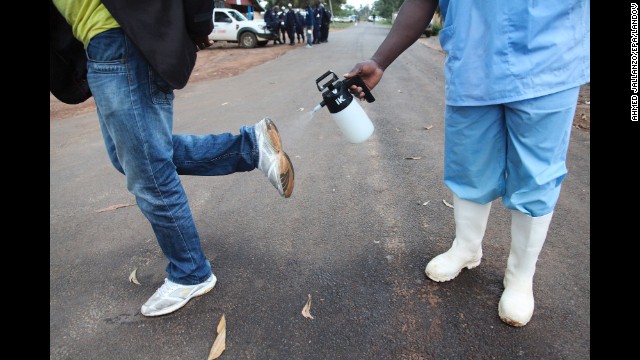 A man gets sprayed with disinfectant Sunday, August 3, in Monrovia.
A man gets sprayed with disinfectant Sunday, August 3, in Monrovia.  Dr. Kent Brantly, right, gets out of an ambulance after arriving at Emory University Hospital in Atlanta on Saturday, August 2. Brantly was infected with the Ebola virus in Africa, but he was brought back to the United States for further treatment.
Dr. Kent Brantly, right, gets out of an ambulance after arriving at Emory University Hospital in Atlanta on Saturday, August 2. Brantly was infected with the Ebola virus in Africa, but he was brought back to the United States for further treatment.  Nurses wearing protective clothing are sprayed with disinfectant Friday, August 1, in Monrovia after they prepared the bodies of Ebola victims for burial.
Nurses wearing protective clothing are sprayed with disinfectant Friday, August 1, in Monrovia after they prepared the bodies of Ebola victims for burial.  A nurse disinfects the waiting area at the ELWA Hospital in Monrovia on Monday, July 28.
A nurse disinfects the waiting area at the ELWA Hospital in Monrovia on Monday, July 28.  Liberian President Ellen Johnson Sirleaf, right, walks past an Ebola awareness poster in downtown Monrovia as Liberia marked the 167th anniversary of its independence Saturday, July 26. The Liberian government dedicated the anniversary to fighting the deadly disease.
Liberian President Ellen Johnson Sirleaf, right, walks past an Ebola awareness poster in downtown Monrovia as Liberia marked the 167th anniversary of its independence Saturday, July 26. The Liberian government dedicated the anniversary to fighting the deadly disease.  In this photo provided by Samaritan's Purse, Dr. Kent Brantly, left, treats an Ebola patient in Monrovia. On July 26, the North Carolina-based group said Brantly tested positive for the disease. Days later, Brantly arrived in Georgia to be treated at an Atlanta hospital, becoming the first Ebola patient to knowingly be treated in the United States.
In this photo provided by Samaritan's Purse, Dr. Kent Brantly, left, treats an Ebola patient in Monrovia. On July 26, the North Carolina-based group said Brantly tested positive for the disease. Days later, Brantly arrived in Georgia to be treated at an Atlanta hospital, becoming the first Ebola patient to knowingly be treated in the United States.  A 10-year-old boy whose mother was killed by the Ebola virus walks with a doctor from the aid organization Samaritan's Purse after being taken out of quarantine Thursday, July 24, in Monrovia.
A 10-year-old boy whose mother was killed by the Ebola virus walks with a doctor from the aid organization Samaritan's Purse after being taken out of quarantine Thursday, July 24, in Monrovia. 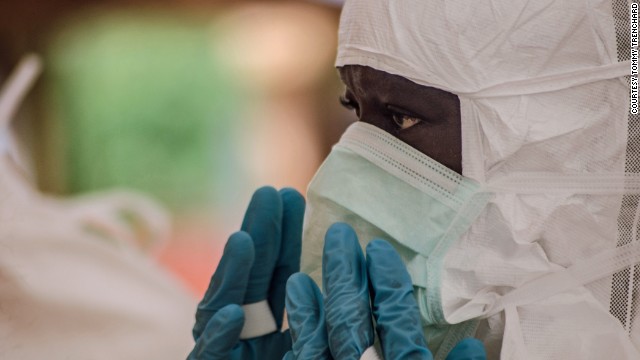 A doctor puts on protective gear at the treatment center in Kailahun, Sierra Leone, on Sunday, July 20.
A doctor puts on protective gear at the treatment center in Kailahun, Sierra Leone, on Sunday, July 20.  Members of Doctors Without Borders adjust tents in the isolation area in Kailahun on July 20.
Members of Doctors Without Borders adjust tents in the isolation area in Kailahun on July 20. 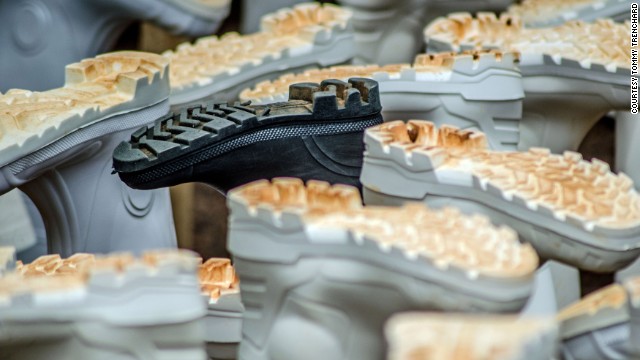 Boots dry in the Ebola treatment center in Kailahun on July 20.
Boots dry in the Ebola treatment center in Kailahun on July 20.  Red Cross volunteers prepare to enter a house where an Ebola victim died in Pendembu, Sierra Leone, on Friday, July 18.
Red Cross volunteers prepare to enter a house where an Ebola victim died in Pendembu, Sierra Leone, on Friday, July 18.  Dr. Jose Rovira of the World Health Organization takes a swab from a suspected Ebola victim in Pendembu on July 18.
Dr. Jose Rovira of the World Health Organization takes a swab from a suspected Ebola victim in Pendembu on July 18.  Red Cross volunteers disinfect each other with chlorine after removing the body of an Ebola victim from a house in Pendembu on July 18.
Red Cross volunteers disinfect each other with chlorine after removing the body of an Ebola victim from a house in Pendembu on July 18.  A dressing assistant prepares a Doctors Without Borders member before entering an isolation ward Thursday, July 17, in Kailahun.
A dressing assistant prepares a Doctors Without Borders member before entering an isolation ward Thursday, July 17, in Kailahun.  A doctor works in the field laboratory at the Ebola treatment center in Kailahun on July 17.
A doctor works in the field laboratory at the Ebola treatment center in Kailahun on July 17.  Doctors Without Borders staff prepare to enter the isolation ward at an Ebola treatment center in Kailahun on July 17.
Doctors Without Borders staff prepare to enter the isolation ward at an Ebola treatment center in Kailahun on July 17.  A health worker with disinfectant spray walks down a street outside the government hospital in Kenema, Sierra Leone, on Thursday, July 10.
A health worker with disinfectant spray walks down a street outside the government hospital in Kenema, Sierra Leone, on Thursday, July 10.  Dr. Mohamed Vandi of the Kenema Government Hospital trains community volunteers who will aim to educate people about Ebola in Sierra Leone.
Dr. Mohamed Vandi of the Kenema Government Hospital trains community volunteers who will aim to educate people about Ebola in Sierra Leone.  Police block a road outside Kenema to stop motorists for a body temperature check on Wednesday, July 9.
Police block a road outside Kenema to stop motorists for a body temperature check on Wednesday, July 9.  A woman has her temperature taken at a screening checkpoint on the road out of Kenema on July 9.
A woman has her temperature taken at a screening checkpoint on the road out of Kenema on July 9.  A member of Doctors Without Borders puts on protective gear at the isolation ward of the Donka Hospital in Conakry, Guinea, on Saturday, June 28.
A member of Doctors Without Borders puts on protective gear at the isolation ward of the Donka Hospital in Conakry, Guinea, on Saturday, June 28.  Airport employees check passengers in Conakry before they leave the country on Thursday, April 10.
Airport employees check passengers in Conakry before they leave the country on Thursday, April 10.  CNN's Dr. Sanjay Gupta, left, works in the World Health Organization's mobile lab in Conakry. Gupta traveled to Guinea in April to report on the deadly virus.
CNN's Dr. Sanjay Gupta, left, works in the World Health Organization's mobile lab in Conakry. Gupta traveled to Guinea in April to report on the deadly virus.  A Guinea-Bissau customs official watches arrivals from Conakry on Tuesday, April 8.
A Guinea-Bissau customs official watches arrivals from Conakry on Tuesday, April 8.  Egidia Almeida, a nurse in Guinea-Bissau, scans a Guinean citizen coming from Conakry on April 8.
Egidia Almeida, a nurse in Guinea-Bissau, scans a Guinean citizen coming from Conakry on April 8.  A scientist separates blood cells from plasma cells to isolate any Ebola RNA and test for the virus Thursday, April 3, at the European Mobile Laboratory in Gueckedou, Guinea.
A scientist separates blood cells from plasma cells to isolate any Ebola RNA and test for the virus Thursday, April 3, at the European Mobile Laboratory in Gueckedou, Guinea.  Members of Doctors Without Borders carry a dead body in Gueckedou on Friday, April 1.
Members of Doctors Without Borders carry a dead body in Gueckedou on Friday, April 1.  Gloves and boots used by medical personnel dry in the sun April 1 outside a center for Ebola victims in Gueckedou.
Gloves and boots used by medical personnel dry in the sun April 1 outside a center for Ebola victims in Gueckedou. 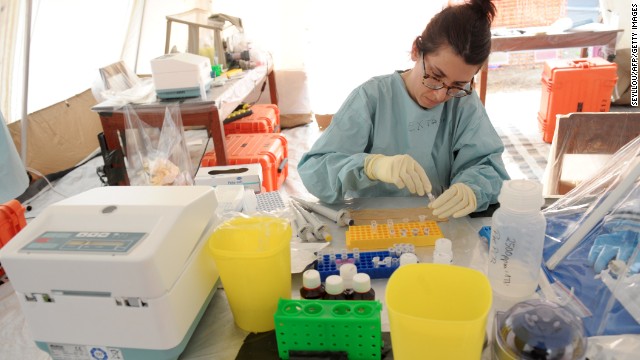 A health specialist works Monday, March 31, in a tent laboratory set up at a Doctors Without Borders facility in southern Guinea.
A health specialist works Monday, March 31, in a tent laboratory set up at a Doctors Without Borders facility in southern Guinea. 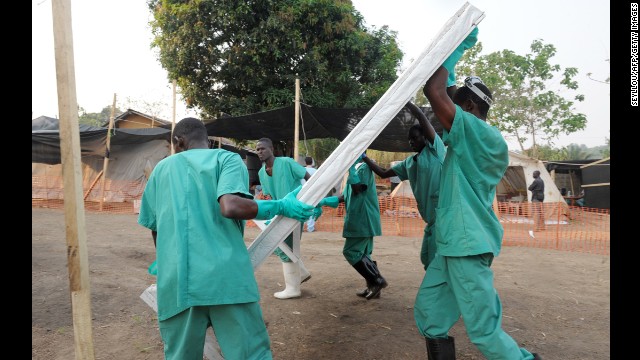 Health specialists work March 31 at an isolation ward for patients at the facility in southern Guinea.
Health specialists work March 31 at an isolation ward for patients at the facility in southern Guinea.  Workers associated with Doctors Without Borders prepare isolation and treatment areas Friday, March 28, in Guinea.
Workers associated with Doctors Without Borders prepare isolation and treatment areas Friday, March 28, in Guinea.
- The CDC has sent nine people to Lagos, Nigeria, to fight the Ebola outbreak
- The World Health Organization says Nigeria has 12 suspected cases, three deaths
- CDC team is helping with tracking the infection, training health care workers
Editor's note: David Daigle is associate director for communications at the Centers for Disease Control and Prevention's Office of Public Health Preparedness and Response. He arrived in Lagos, Nigeria, on August 7 with a team of CDC specialists sent to West African nations battling Ebola.
(CNN) -- There are nine of us from the Centers of Disease Control and Prevention in Lagos, Nigeria.
We arrived from different U.S. states, or from the CDC's polio team already in Nigeria, and possess varying skill sets, including infection control, global migration and quarantine, data management, epidemiology and communications.
We're here to work with colleagues and partners from Nigeria's Ministry of Health, UNICEF, Doctors Without Borders and the World Health Organization to stop the largest Ebola outbreak in history -- the first in a densely populated, urban environment.
Nigeria is the latest country to become affected by the outbreak. The first person to die of Ebola here was an American named Patrick Sawyer, who arrived from Liberia. Now WHO suspects Nigeria has had 12 cases and three deaths.
Our team in Lagos is a small part of the CDC's effort to fight Ebola, with work going on in several African countries, and back in the United States at our headquarters in Atlanta. There, the CDC's Emergency Operations Center has activated its highest level to maintain 24/7 operations to coordinate the agency's efforts.
 How Ebola got out of control
How Ebola got out of control  Going through Ebola checkpoint
Going through Ebola checkpoint  Inside an Ebola outbreak epicenter
Inside an Ebola outbreak epicenter  Why we fear Ebola
Why we fear Ebola We are five hours ahead of Atlanta, a fact my family has yet to grasp as I receive texts during odd hours asking, "What's Lagos like?" and "What are you doing?"
Good questions.
A typical day for our team begins at a hotel -- one big advantage of an urban outbreak. After breakfast we move to one of several locations, including the hospital, U.S. Consulate or a training site, depending on the work to be done that day.
Team Lagos is working as part of a much larger team in Nigeria to find and isolate all possible patients, tracking down everyone who could have been exposed to Ebola, and educating the public about the risks.
A great deal has been accomplished in a short time. A Nigerian emergency operations center is up and running now, and we are about to move Ebola patients into a newly, remodeled treatment facility.
There are 60 folks on the contact tracing team, which has been tracking more than 200 people thought to have come in contact with the virus. These teams visit the contacts daily to take their temperatures and check to see if they have developed any symptoms. On Tuesday, 147 of the 152 contacts were visited and assessed. When difficulties arise locating contacts, additional teams are employed and efforts ramped up to conduct the tracing.
The Ebola response team in Nigeria recently saw 30 people finish the 21-day risk period -- the longest time period during which Ebola symptoms have been known to be present. These 30 people were able to leave the contact tracing list, which is a hopeful sign.
There is a great deal of fear in Lagos as many worry about a virus of which they know precious little. CDC communicators like myself work to provide accurate information to the public and health care workers. Health care workers are critical as they are on the front lines of this battle; WHO says 10% of the deaths during this epidemic have been health care workers.
Our infection control experts have been training workers on proper infection control and teaching them how to don Personal Protective Equipment properly, a critical task given this virus.
I was taking pictures of this training near the Ebola ward when one of the trainers came out of the "hot zone" and asked if anybody had a paperback to give one of the patients. I donated a weathered copy of Shakespeare's "Henry the IV, Part 1." (I always carry a book on deployments). So the Bard has entered the Ebola ward in Lagos.
A newspaper headline shows the dangers of false information being spread in Nigeria about Ebola treatments.
One interesting aspect of this outbreak has been the rumors and misinformation spurred by Ebola. Last week, communicators were working quickly to respond to a rumor that bathing in or drinking salt water would prevent Ebola. I have seen local press coverage that notes two people may have died from attempting this treatment.
As I write this, we are in a temporary emergency operations center at a psychiatric hospital, waiting for remodeling to be complete on our own center. We made the change with some grumbling but did not miss a beat -- flexibility is essential in an evolving outbreak situation.
Our work is made more difficult by traffic in the city, a lack of Internet connectivity and security, which is a concern. We typically make it back to the hotel late, anywhere between 9 and 11 p.m. local time and try to eat together.
Team members who gather are tired, and the outbreak dominates the conversation. But we also try to distract ourselves: On my third night, a team member asked, "Has anyone else noticed that the background music is all Celine Dione?" It was true. Turns out she has quite a few songs, and I am pretty sure we have heard them all.
I am not afraid of catching the Ebola virus. I know how Ebola is transmitted and will not put myself in jeopardy, thinking of my wife and four children at home.
The work is long, hard, challenging but worthwhile. The CDC team in Lagos is amazing, one of the best I have been on. And the larger response team that includes all our partners and our colleagues from Nigeria is doing important work to break the Ebola infection cycle.
Read: Canada to donate untested Ebola vaccines
Read: Patient Zero in Ebola outbreak identified?
No comments:
Post a Comment